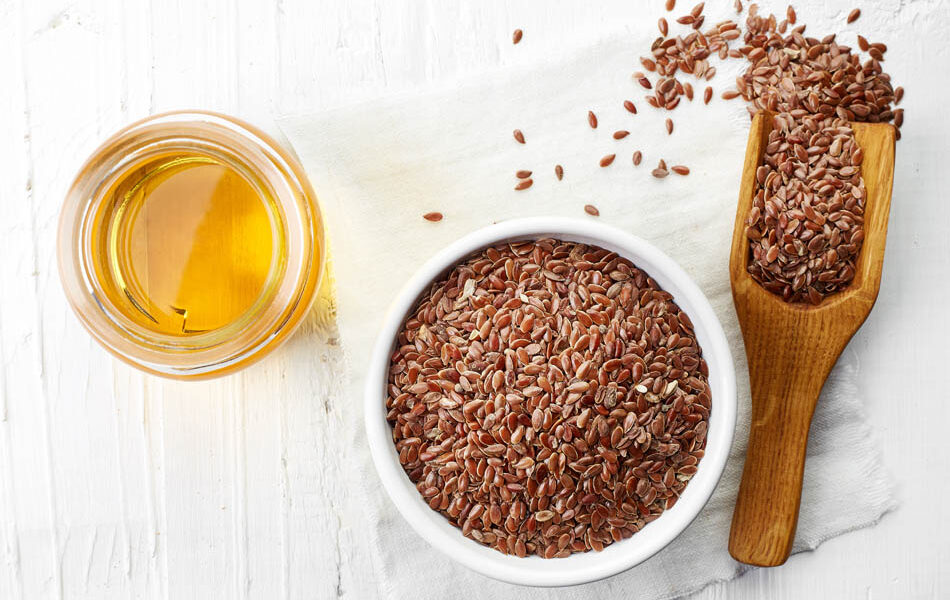Is Flaxseed Oil Healthy? Nutrition Facts and 6 Health Benefits
Analysis of nutritional and cosmetic properties of flaxseed oil, a valuable seed widely used in many cultures since ancient times.

Many years ago, flaxseed or linseed oil was used in Northern Europe in many types of paints, being the favorite of artists thanks to its flexibility and durability. But is flaxseed oil healthy and safe for consumption?
Flaxseed oil is a hidden treasure since few people know its multiple uses not only in the kitchen but also as a main ingredient in home treatments for skin and hair. Its richness in nutrients, including good fats, gave it an important place in the diet.
Flaxseed oil is an important source of antioxidants, mainly lignans, which are favorable to fighting free radicals and preventing premature aging.
Read the most interesting facts about the nutritional value and flaxseed oil benefits with the Health Reporter team and find out how you can make it part of your health and beauty routines.
What Is Linseed/Flaxseed Oil?
Flaxseed oil is obtained by processing the seeds of the Linum usitatissimum family, which have a high concentration of omega-3 fatty acids ALA (alpha-linolenic acid), highly valued for their role in cardiovascular and nervous system protection.
Flaxseed is a plant that has been cultivated since ancient times and has been put to various uses thanks to its moisturizing properties. The best source of this oil comes from the cold pressing of the seeds, which results in an oil rich in nutrients that can be used for aesthetic and nutritional purposes.
Flaxseeds are an important source of healthy omega-3 fatty acids, especially for vegans who do not eat fish and fish oil, and also provide protein and phenolic compounds. Many benefits of flaxseed oil come from its high antioxidant content, which gives it great value in the area of cosmetology and nutrition.
Is Flaxseed Oil Healthy?
Yes, flaxseed oil is undoubtedly healthy as it is rich in nutrients, including good fats, vitamins, minerals, and antioxidants. Flaxseed oil benefits are recognized in the beauty industry for topical use, and its properties are also obtained through its consumption as part of the daily diet or as a supplement.
Flaxseed oil is a highly valued oil that also has applications in the textile, paint, and wood industries.
In medicine, flaxseed oil can be found as a nutritional supplement and as part of treatments to lower blood pressure and prevent diabetes and cancer.
6 Health Benefits of Flaxseed Oil
#1 Prevents premature aging
Its richness in antioxidants known as lignans allows flaxseed oil to be used as an important anti-aging agent by preventing free radicals from damaging cells. This translates into healthy connective tissues and body systems, healthy skin, and strong, shiny hair.
#2 Reduction of kidney damage
Some studies conducted on patients with kidney disease show flaxseed oil benefits in reducing renal lesions in pathologies such as polycystic kidney disease, making it preferable to use unprocessed flaxseed.
#3 Gastrointestinal health
While consuming whole flaxseed may mean a decrease in its properties since it is not completely digested, consuming flaxseed oil may increase its digestive properties, which include relieving constipation by promoting intestinal transit.
During the consumption of foods rich in fats, such as flaxseed oil, there is an increase in the secretion of bile which helps digest fats. This increased digestive activity is what promotes bowel movement.
In addition, omega-3 fatty acids, being a potent anti-inflammatory, favor the integrity of the epithelial barrier of the digestive system, this effect being beneficial even for children with the autistic spectrum.
#4 Better concentration and memory
It is widely known that fatty acids are favorable for the health of the nervous system. A healthy nervous system supports cognitive functions such as memory and concentration.
Also, good fats such as omega-3 fatty acids in flaxseed oil are a great ally to prevent and improve the symptoms of depression.
#5 Immune system regulation
Some studies show the direct regulatory activity of omega-3 fatty acids on specialized immune system cells known as CD4+ T lymphocytes. These cells are part of the primary immune response to various infections and diseases, such as cardiovascular disorders.
#6 Dermatitis treatment
Some studies have shown that applying flaxseed oil on the skin can improve the symptoms of eczema, a type of atopic dermatitis. Some symptoms of this condition are reddened skin, itching, and damage to the skin surface.
Flaxseed oil reinforces the skin barrier by reducing the elimination of lipids from the stratum corneum responsible for keeping the skin intact and regulating its protective functions.
3 Side Effects of Flaxseed Oil
Before purchasing flaxseed oil, it is important to verify that the product label says “cold pressed,” ensuring you are getting a quality product. Also, it should be stored in a cool place away from light to avoid spoilage.
Flaxseed oil has no strong odor or taste, so it should not leave any aftertaste when consumed, unlike fish oil which leaves a somewhat unpleasant fishy taste or the particular bitter taste of olive oil.
Once you make sure that you are taking the correct and well-preserved oil, you will know that it is safe for you most of the time; however, some people might suffer from unwanted effects such as:
- Allergic reactions
- Loose stools or diarrhea
- Flatulence and bloating
To avoid unwanted effects, it is recommended to consume one tablespoon daily, and if you tolerate it well, you can take up to 2 tablespoons to ensure an adequate dose of omega-3 fatty acids or alpha-linolenic acid (ALA).
Nutrition Facts of Flaxseed Oil
Flaxseed oil contains mostly polyunsaturated fatty acids, which give it most of its nutritional properties. The following table shows the nutritional value of a 100g serving of flaxseed oil.
Nutritional value (per 100g)
| Calories/Nutrient (per 100g) | Amount |
| Calories (kcal) | 884 |
| Sodium (mg) | 0 |
| Net Carbs (g) | 0 |
| Fiber (g) | 0 |
| Sugar (g) | 0 |
| Fats (Total) | 100 |
| Protein (g) | 0.11 |
https://fdc.nal.usda.gov/fdc-app.html#/food-details/167702/nutrients
High in calories and fats
Flaxseed oil is high in calories because it is primarily a source of fat as well as any other oil of vegetable origins such as olive or canola oil. Fat is a macronutrient that contributes 9 calories per gram, so this oil should be used in moderation.
For medicinal use, no more than 2 tablespoons per day are recommended, which can be used to sauté foods such as vegetables at low temperatures. It is not recommended to fry foods with this oil since it is not stable at high temperatures.
High in protein
Seeds such as flaxseed, chia, and sesame are plant-based protein sources.
However, they do not have the entire amino acid chain to form a complete protein, so in plant-based diets, it is recommended to combine seeds with other vegetable sources of protein, such as cereals and nuts.
Low in carbohydrates
Although flaxseeds contain carbohydrates which are mostly soluble fiber, once these seeds are processed to obtain the oil, only the fatty part is extracted.
This means that flaxseed oil is a source of fat in its entirety and concentrates all the properties in a small portion, making it suitable for high-fat diets such as the ketogenic diet.
High in vitamins and minerals
The main vitamins contained in flaxseed oil are mostly from the B complex, especially B1, B2, and B6. Vitamin B1 has positive effects on the skin because it strengthens the dermis and promotes hydration which gives elasticity and shine to the skin.
At the same time, vitamin B1 has regulatory effects at the cellular level that increase the healing capacity. As a result, linseed oil is frequently used in home treatments for masks that are applied to the face and the entire body.
In addition, flax oil has a high concentration of minerals such as copper and magnesium, which are involved in numerous metabolic processes, promote enzyme activity, and support immunity.
What Is Flaxseed Oil Used for?
Flaxseed oil can be used internally and externally, both being safe and beneficial.
To apply it on the skin, just rub a little on your hands twice a day and massage gently until it spreads completely and evenly. You can also add a few drops of organic flaxseed oil to your moisturizers to enhance their effects and soothe dry skin.
In the kitchen, this oil is very useful for sautéing veggies that do not require much cooking time; just stir-fry for a few minutes over low heat so as not to modify the nutrients of either the oil or the vegetables. Flaxseed oil does not add any strong flavor other than a slightly nutty touch, unlike olive oil, which can completely change food flavor.
To help your intestinal transit, add a tablespoon to a glass of water and drink it in the morning on an empty stomach or take one tablet of flaxseed oil supplements.
If you are looking for more recipes that make you feel good and are full of health benefits, you can download the DoFasting app, which has a library of over 5,000 options that are especially useful if you practice intermittent fasting, as it will allow you to organize your eating windows with reminders and motivation.

- Useful progress tracker and calendar
- Calorie tracker to track daily caloric intake
- Over 5,000 nutritious recipes
FAQs
No, flaxseed oil is a high-calorie source of fat. However, flaxseed can be included in a weight loss diet because it retains soluble fiber and protein.
Flaxseed oil is good for your overall health. Flaxseed oil supplements have multiple uses, including skin, digestive, cardiovascular, neurological, and immune health.
Yes, thanks to its richness in vitamins, minerals, and fatty acids, flaxseed oil is a product widely used to treat various skin problems such as eczema and dryness.
A Word From a Nutritionist
Seeds are foods rich in good fats, which makes them an excellent ally in combating diseases of the cardiovascular system, such as high blood pressure.
Flaxseeds and flaxseed oil are related to lowering blood pressure due to their omega-3 fatty acid content, so you should consult your doctor before taking them if you are using medication for hypertension.
Flaxseeds contain a specific type of omega-3 fatty acid known as alpha-linolenic acid. On the other hand, omega-3 fatty acid from fish oil contains two different types: eicosapentaenoic acid (EPA) and docosahexaenoic acid (DHA). All fatty acids are good fats beneficial for blood pressure.
Eating a teaspoon of flaxseed with your oatmeal or adding flaxseed oil to a salad from time to time may be harmless, but taking flaxseed oil or flaxseed oil supplements daily means consuming a higher concentration of the active compounds, so you should take them with extra caution.
Conclusion
Flaxseed oil is an important source of good fats and antioxidants.
Flaxseed oil benefits come from its omega-3 fatty acid content. Omega-3 fatty acids have a fundamental role in preventing and treating diseases of the cardiovascular system.
Flaxseed oil becomes an ideal choice for people following a vegan diet who do not take fish oil. It is also ideal for those who want to avoid the aftertaste of fish oil capsules, as the flaxseed oil supplement does not have a strong taste.
To take your beauty routine to the next level, you can start by adding flaxseed oil to your moisturizers for daily application.
You can also try incorporating flaxseed oil from organic cold-pressed linseed for cooking or seasoning your dishes.

















































 Select your language:
Select your language: 








